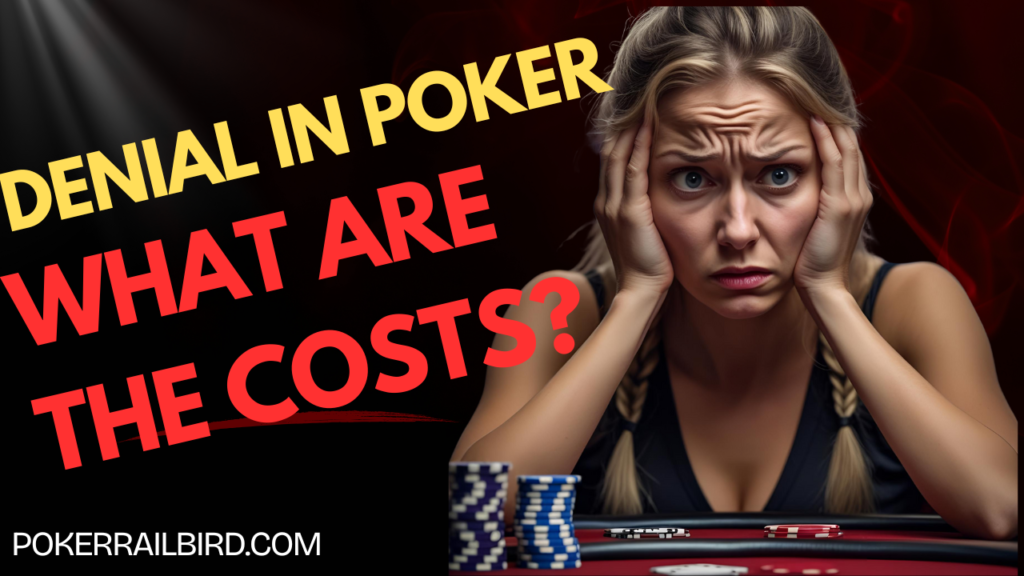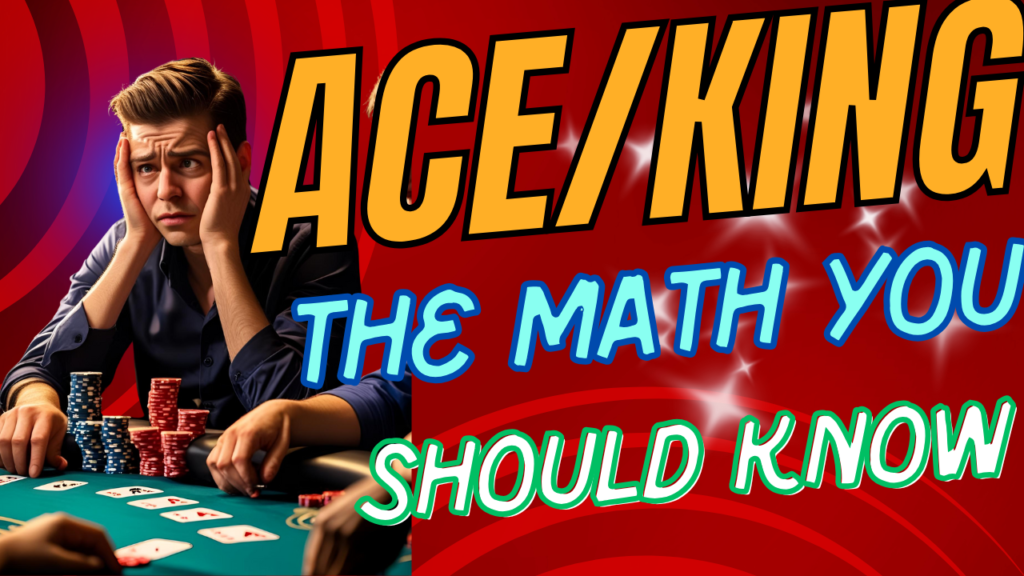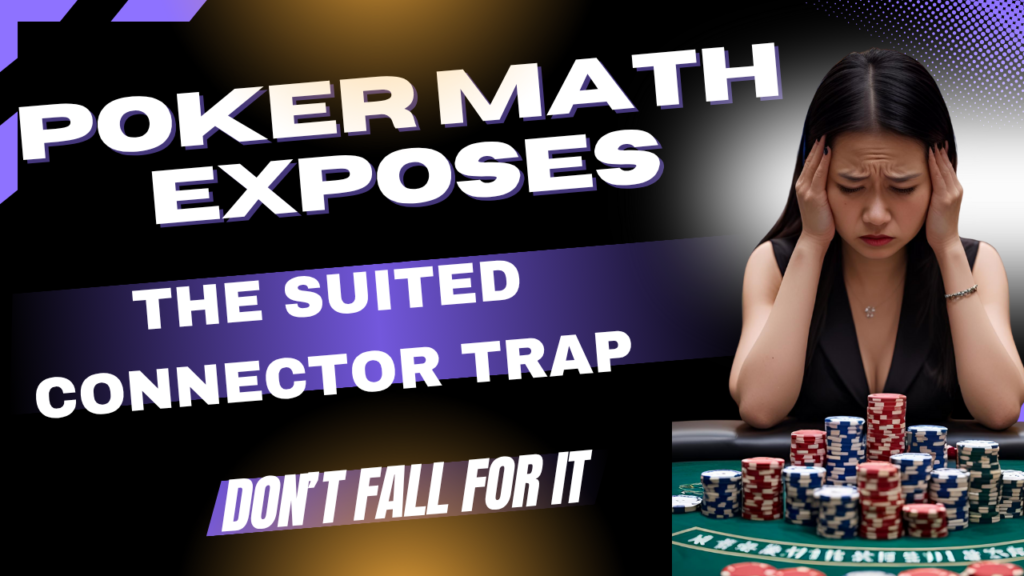THE PSYCHOLOGY OF LUCK
DEADLY SIN NO. 10 - BLAMING BAD LUCK
The psychology of luck is one of the most misunderstood forces in poker. We call it fate, fortune, or variance — but most of the time, it’s a convenient lie we tell ourselves when things go wrong.
According to the dictionary, luck is “success or failure apparently brought by chance rather than through one’s own actions.”
That word apparently is doing a lot of heavy lifting.
In poker, “luck” has become the most convenient lie ever told. It’s the story we whisper to ourselves when the cards turn against us, the excuse we use to soften the blow of a bad night, and the reason we stop looking inward.
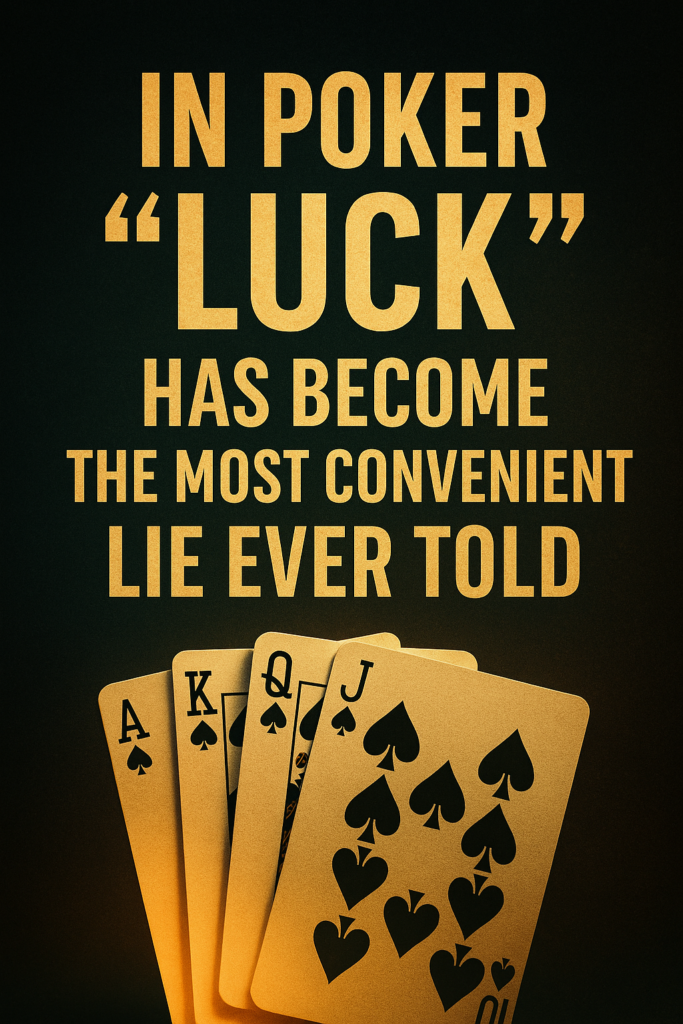
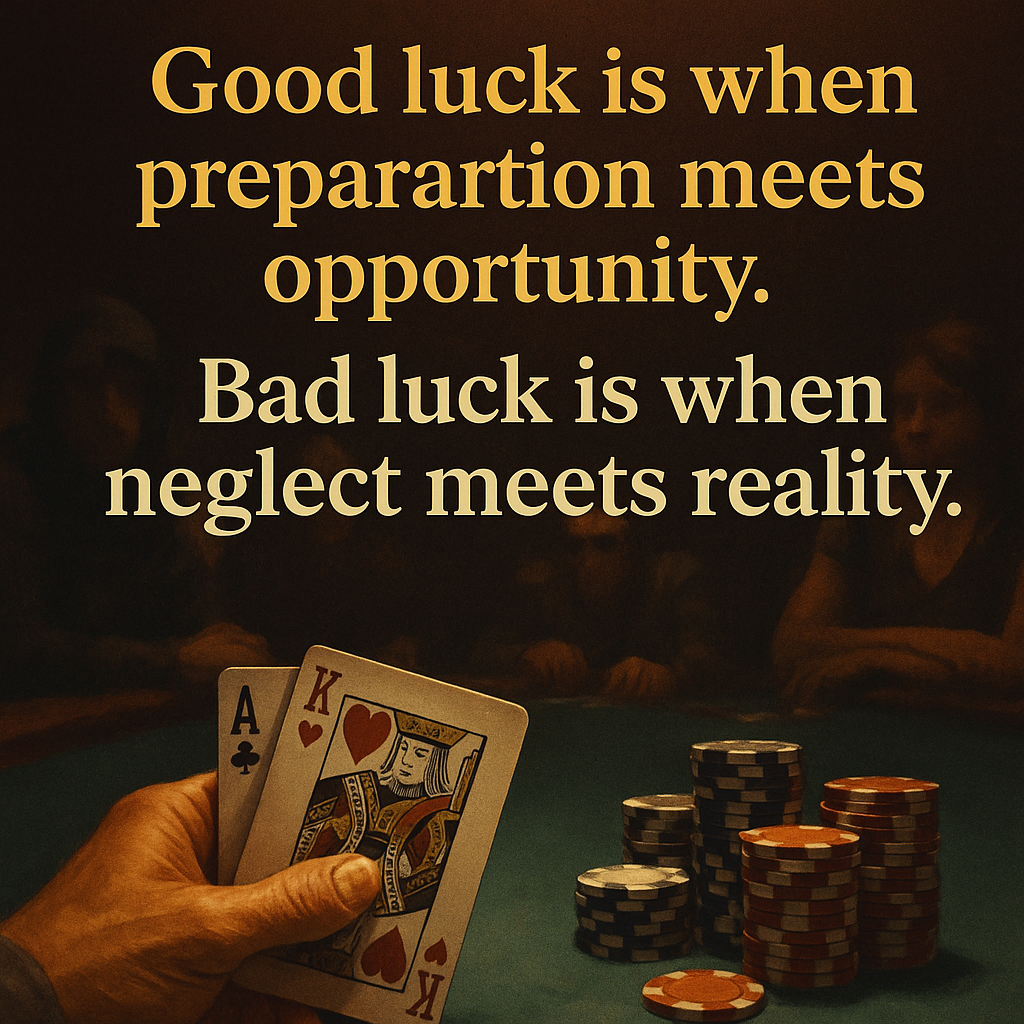
At PokerRailbird, we define luck differently:
“Good luck is when preparation meets opportunity. Bad luck is when neglect meets reality.”
That’s the real psychology of luck — it’s rarely random. It’s often the mask we put on to protect our ego.
And in poker, that mask costs more than any bad beat ever could.
Because when you blame luck, you hand your power over to the cards.
When you take responsibility, you take that power back.
THE PSYCHOLOGY OF LUCK: WHY WE BELIEVE IN IT
Poker is a game of probability — but the human mind isn’t wired for probability. It’s wired for patterns, control, and meaning. The psychology of luck explains why even the most logical players fall into irrational thinking the moment chance turns against them.
Our brains evolved to find order in chaos. That instinct once kept our ancestors alive — spotting patterns in rustling bushes could mean avoiding predators. But at the poker table, that same pattern-seeking impulse becomes a trap. We start connecting dots that don’t exist: “I always lose with pocket tens,” “Seat 3 is cursed,” “The dealer hates me.”
In reality, it’s not the cards conspiring against you — it’s your brain trying to make sense of randomness.
.
THE ILLUSION OF CONTROL
CONFIRMATION BIAS AND THE GAMBLER'S FALLACY
The mind despises uncertainty. When faced with randomness, it invents control to feel safe. That’s why players wear lucky hoodies, stack chips in ritual patterns, or cut the deck “just right.” These small acts of superstition create the illusion that we influence outcomes.
In truth, the only thing we can control in poker is decision quality — not results. The more we try to control chance, the more chance controls us.
We remember the times our “lucky charm” worked and forget the dozen times it didn’t. This selective memory — confirmation bias — keeps false beliefs alive. It’s why someone who loses ten hands in a row believes they’re “due” to win the next one. That’s the gambler’s fallacy — a logical error that turns probability into prophecy.
At the table, it sounds like:
“I haven’t hit a flop in an hour — it’s my turn.”
But probability doesn’t care whose turn it is.
.
COGNITIVE DISSONANCE AND EGO PROTECTION
When results don’t match expectations, we feel internal tension — what psychologists call cognitive dissonance. To protect the ego, we resolve that discomfort by blaming luck instead of ourselves.
“I played it perfectly — just got unlucky.”
That one sentence kills more improvement than any bad beat in history.
The truth? Maybe you did play it well — but maybe you didn’t. Only honest reflection can tell the difference. The moment you stop analyzing and start rationalizing, you’ve stopped getting better.
Luck also plays a powerful emotional role. When things go wrong, believing in luck keeps us from despair. Hope becomes a crutch — the emotional equivalent of a “lucky charm.” But in poker, hope without reason is just denial dressed up as optimism.
The professional learns to trade hope for patience — to accept variance without surrendering logic.
🎯 Belief in luck is the mind’s way of protecting the ego — not improving performance.
THE POKER REALITY
VARIANCE, SKILL AND THE MIRAGE OF 'RUNNING BAD'
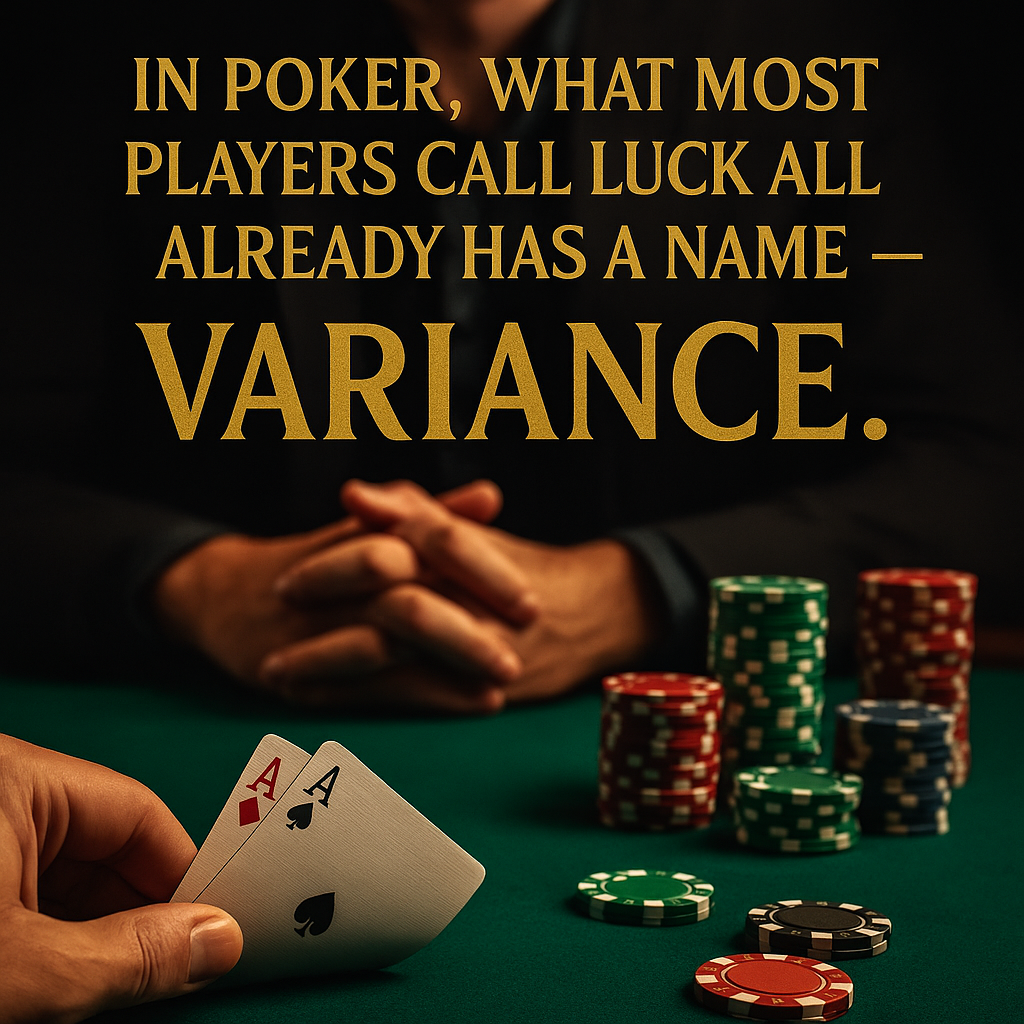
In poker, what most players call luck already has a name — variance. It’s the mathematical heartbeat of the game, the natural rhythm of wins and losses that unfolds over thousands of hands. Understanding this distinction is essential to understanding the psychology of luck in poker.
Variance isn’t luck — it’s structure. It’s how probability expresses itself over time. You can’t escape it, you can only learn to live inside it.
Yet players constantly misinterpret it. When the cards go cold, they say they’re “running bad.” When they win every showdown, they call it “finally getting lucky.” But variance doesn’t care about your emotions or your timing. It’s simply the law of large numbers at work — and if you play long enough, it always comes to collect.
VARIANCE IS THE DEALER'S JOB-DISCIPLINE IS YOURS
Variance shuffles the deck. You decide how to play it.
That’s the line that separates professionals from pretenders.
Here’s the difference:
- The amateur reacts to short-term swings as if they define their destiny.
- The professional sees variance as noise inside a signal — temporary distortion around long-term truth.
When you lose three buy-ins in a row, variance is doing its job. When you tilt, chase, or start blaming “bad luck,” you’re failing at yours.

THE MIRAGE OF "RUNNING BAD"
Let’s be honest — sometimes you do get your money in good and lose. But here’s the hard truth: most “bad runs” are not bad luck — they’re bad habits hiding behind statistics.
Players misjudge ranges, overvalue top pair, or slow-play monsters into danger. Then, when it collapses, they say, “I’m cursed.”
That phrase — I’m cursed — is a psychological shield. It protects your ego but kills your progress.
Variance doesn’t care who’s “due” to win. It just ensures that every hand eventually returns to its mathematical expectation. You can’t beat variance, but you can outperform your opponents within it — through tighter discipline, sharper observation, and unwavering patience.
LUCK VS. EXPECTATION - THE TRUE DIVIDE
Players love to say, “I just got unlucky.” But most of what we call bad luck is really just bad expectation disguised as emotion.
Let’s look at it in real terms.
You raise preflop with Ace-King, miss the flop — which happens about 65% of the time — and then fire a continuation bet into pocket eights. You lose the pot and call it “bad luck.”
But was it? You had roughly a 32% chance to pair on the flop. When you missed, your odds dropped to around 13% on the turn and 13% on the river. That’s not misfortune — that’s math.
Same with that 7♠8♠ suited everyone loves. From preflop to river, you’ll make a straight or flush only about 15% of the time. So when you do make it and still lose to a higher flush, that’s not bad luck — that’s variance doing exactly what probability says it will.
Or the classic trap: you call a preflop raise with A♣3♦, the flop comes A-high, and you think you’ve struck gold — until showdown, when you’re staring at A♠Q♠. Again, not bad luck. Bad decisions, based on an incomplete understanding of hand strength and relative value.
🎯 You don’t lose because you’re unlucky — you lose because your expectations don’t match reality.
Luck isn’t an outcome — it’s a story told by players who didn’t calculate their odds.
THE COST OF BLAMING LUCK - THE MINDSET TRAP
Blaming luck is poker’s most seductive form of self-deception. It feels harmless — even rational — in the moment. But every time you blame luck, you surrender something vital: accountability.
That’s the hidden cost.
When you say, “I just got unlucky,” you relieve yourself of responsibility. You don’t have to analyze the hand, review your logic, or face the uncomfortable truth that maybe you made a poor decision. It’s a psychological shortcut that protects your ego while quietly sabotaging your progress.
In the short term, blaming luck soothes frustration.
In the long term, it freezes development.
THE VICTIM MINDSET
HOW IT DESTROYS GROWTH
THE PROFESSIONAL'S APPROACH
Every player has seen it — the guy who mutters, “I can’t win a hand tonight,” slams his chips, and folds half-heartedly for the rest of the session. He’s not playing poker anymore; he’s playing self-pity.
That’s the victim mindset, and it’s poison to improvement.
Once you decide the cards control your destiny, you stop trying to influence it. You stop looking for patterns in your own play, stop reviewing hands, stop adapting.
In poker — as in life — the victim mindset feels comforting because it removes accountability. But it also removes power.
🎯 If luck gets the blame, it also gets the credit. And that means you’ve learned nothing.
Here’s what really happens when you consistently blame luck:
- You stop collecting data — because you’ve already decided the outcome was random.
- You stop seeking leaks — because you assume there’s nothing to fix.
- You reinforce emotional decision-making — because you believe emotion, not math, dictates results.
It becomes a self-reinforcing cycle. You lose, blame luck, avoid analysis, and keep repeating the same mistakes — while convincing yourself the universe owes you a win.
Poker doesn’t owe anyone anything.
But it will reward those who take ownership.
Professional players experience the same variance, the same bad beats, the same stretches of cold cards. The difference is how they interpret them.
The pro doesn’t say, “I ran bad.”
They say, “Let’s look at the data.”
They study hands, review decisions, and isolate leaks — because they understand that every loss carries information. Every “bad beat” is feedback if you’re willing to hear it.
Poker doesn’t punish failure; it punishes denial.
BREAKING THE CYCLE - SEEING LUCK FOR WHAT IT REALLY IS
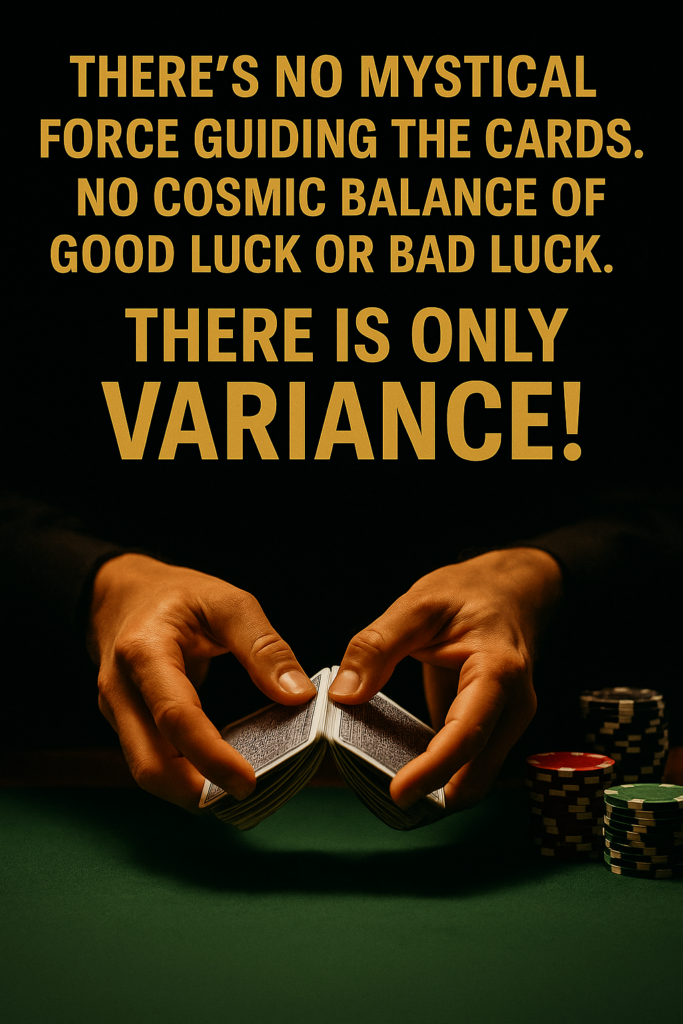
There’s no mystical force guiding the cards. No cosmic balance of good luck or bad luck. There is only variance — the mathematical reality that governs all random events. What we call luck is simply our emotional interpretation of that variance.
The psychology of luck reveals more about us than it does about the cards.
It shows how the human mind personalizes randomness. When something improbable happens — good or bad — we label it “luck” to make sense of it. We turn data into drama.
But variance has no memory, no agenda, no bias.
It doesn’t punish or reward.
It just is.
When you hit a one-outer on the river, it isn’t luck — it’s math catching up with possibility. When your opponent loses to that one-outer, it isn’t bad luck — it’s the other side of the same probability curve.
What feels like “fortune” or “injustice” is just variance expressing itself in real time.
YOU GIVE LUCK ITS POWER
VARIANCE, NOT LUCK, IS THE TRUE TEACHER
Nothing in poker — or life — has power until you assign it meaning.
No one can make you angry, or happy, or “unlucky.” They can only act — you decide what it means.
The same applies to poker.
Variance presents outcomes. You decide whether to call it luck or learning.
The moment you assign moral value — “good” or “bad” — you hand over your agency to something that doesn’t even exist.
🎯 There’s no such thing as bad luck — only bad interpretation.
Variance isn’t an enemy to be beaten; it’s a teacher to be understood. Every improbable loss reveals whether your thinking is rooted in discipline or denial.
The pro accepts variance as data.
The amateur resists it as destiny.
And that distinction — acceptance versus resistance — defines every player’s path from emotional to rational, from reactive to deliberate.
In the Church of Reason, poker’s only truth is form. The form of variance, the form of probability, the form of cause and effect. There’s no moral balance, no karmic scoreboard — only math, choices, and the quality of your thinking.
CLOSING REFLECTION - BEYOND POKER
Poker is a mirror, and what it reflects most clearly is the player sitting behind the chips.
Blaming luck is never about the cards — it’s about how we see ourselves.
When you remove the illusion of luck, what’s left is truth: the sum of your preparation, patience, and discipline. The cards don’t conspire against you. They simply reveal who you are when they don’t cooperate.
That’s the real psychology of luck — not chance, but choice.
Not fortune, but focus.
Variance tests everyone. The difference is that some players take it personally, and others take it as feedback. One group chases luck; the other studies it. And over time, the students of variance are the ones still standing.
.
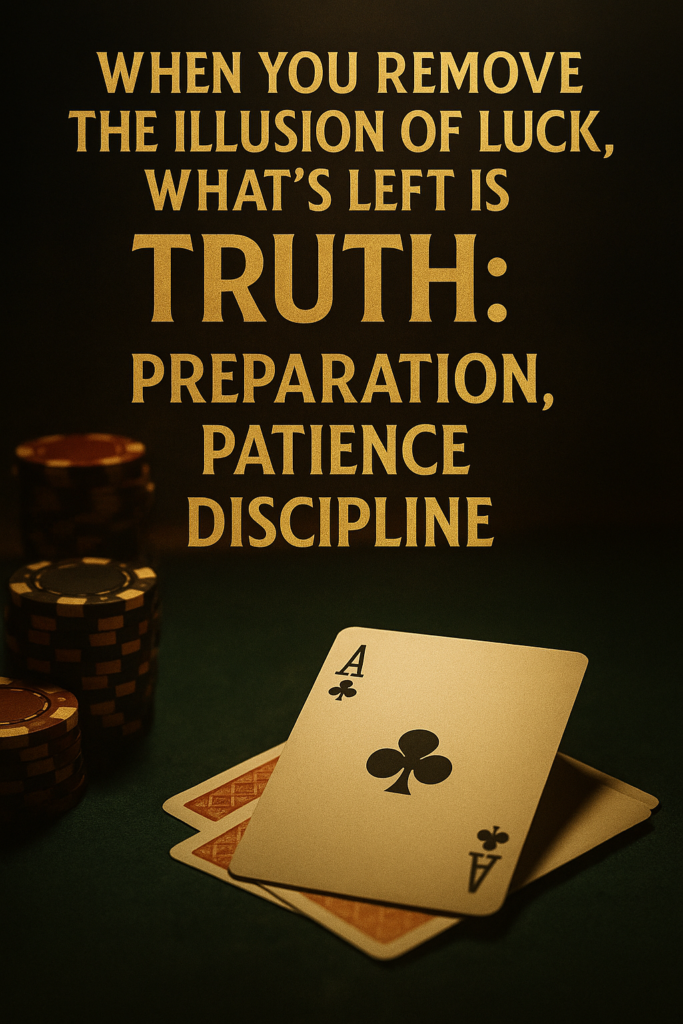
BEYOND THE TABLE
The lessons stretch far past poker.
Life, like poker, is filled with randomness — events you can’t predict or control. But the meaning you assign them determines whether you grow stronger or weaker.
The person who blames “bad luck” becomes bitter. The one who studies variance becomes wiser.
The first looks for excuses.
The second looks for form.
In the Church of Reason, we don’t fear variance. We embrace it. Because it’s proof that the world is still unpredictable — and that mastery isn’t about control, but clarity.
So, the next time you take a bad beat, remember this:
Luck isn’t real.
Variance is.
And your reaction to it is where the real game begins.
🎯 You can’t control the cards, but you can always control your perception of them.

